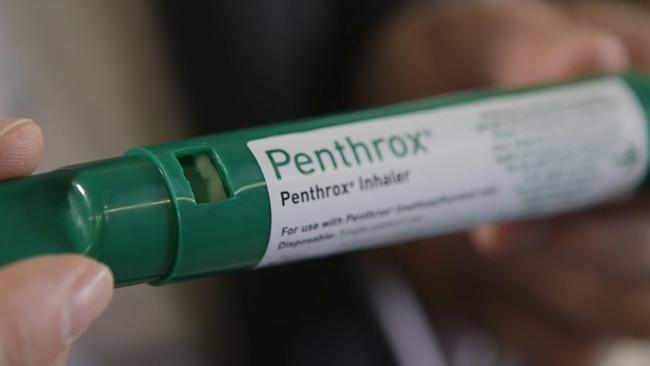Women push for pain relief after breakthrough IUD project
It’s a common but sometimes painful procedure some find “worse” than childbirth. So why don’t women get pain relief — and could this Melbourne hospital change that?

Victoria
Don't miss out on the headlines from Victoria. Followed categories will be added to My News.
Women should be offered better relief for a common but painful procedure, clinicians say, as a Melbourne hospital challenges the long-held belief women should tolerate the pain.
Peninsula Health is believed to be the state’s first public clinic to offer a ‘green whistle’ to patients getting IUDs, a long-lasting contraceptive inserted into the uterus.
The whistle allows patients — typically offered less effective options like paracetamol and a local anaesthetic — to inhale a fast-acting painkiller methoxyflurane, that is popular in ambulances.
Peninsula Health Obstetrics and Gynaecology clinical director Dr Nisha Khot said she was “struck” a few years ago by a social media discussion describing the quick procedure as “worse than having a baby” — having been taught it was just “uncomfortable” and mothers especially were fine.
“I read replies under it from hundreds of women who described how IUD insertion had been painful . . . that they would never have it again,” she said.
“We have not really catered to the fact that women . . . will have different pain thresholds.
“We never spoke about it [in training].”
Dr Khot emphasised not all woman find insertions or removals painful, but said those who do deserve better, with some so upset they avoid removal appointments years later and discourage friends.
“This whole issue . . . . is putting people off something that would really help them,” she said.
“The IUD is actually one of the best methods of contraception we have. It’s reliable, long-acting.”
Also the Royal Australian and New Zealand College of Obstetricians and Gynaecologists vice president, Dr Khot said she would like to see more women offered the whistle or an anaesthetic gel, which has been trialled elsewhere.
Peninsula Health nurse practitioner Cathy Halmarick, who led the project, said the whistle has made “such a difference” to patients, including those with previous trauma, and the small dose was “extremely safe”.
“Some woman still experience discomfort, but it’s a vast improvement,” she said.
She said, since its introduction earlier this year, about half of patients use it and even those who don’t still benefit — with some relaxed by the knowledge the option is there.
She said healthcare had “become accustomed” to expecting women will endure pain “they really don’t need to” — from childbirth to painful periods.
“I for one want to provide women with choice about what they will endure,” she said.
A Melbourne mum, who had been on a lengthy waitlist for an IUD under general anaesthetic, used the green whistle last month and wants it offered to all.
The woman, who did not wish to be named, said her first IUD felt like “someone grabbing my organs from inside out” but this time she could relax and finish the procedure.




